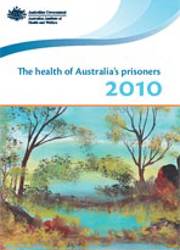Summary
The health of Australia’s prisoners 2010 is the second report relating to the National Prisoner Health Indicators, which were developed to help monitor the health of prisoners, and to inform and evaluate the planning, delivery and quality of prisoner health services. The indicators presented in this report are aligned to the National Health Performance Framework. The results in this second report build on the baseline information from the first National Prisoner Health Census, and this time include some state and territory comparisons.
Mental health issues
Prisoners in Australia have high rates of mental health related issues. In 2010, 31% of prison entrants reported having ever been told that they had a mental health illness and 16% of prison entrants reported that they were currently taking mental health related medication. On entry to prison, almost one-fifth of prison entrants were referred to the prison mental health services for observation and further assessment following the reception assessment.
Almost 1 in 10 prisoners in custody visited the clinic for a psychological or mental health issue, and 1 in 5 prisoners in custody was taking mental health related medication. When looking at the type of medication, 18% of all repeat medication was for depression/mood stabilisers, 9% for antipsychotics, 2% for anti-anxiety medication and 1% for sleep disturbance.
Risky health behaviours
Prison entrants in Australia reported previously engaging in various risky health behaviours, such as smoking tobacco, drinking alcohol at extreme levels and using illicit drugs. Four in five prison entrants reported being a current smoker, and three in four reported being a daily smoker. More than half of prison entrants reported drinking alcohol at levels that placed them at risk of alcohol-related harm, while less than twenty per cent reported that they did not drink. Further, two-thirds of prison entrants reported illicit drug use in the previous 12 months. These rates are all substantially higher than in the general community.
Aboriginal and Torres Strait Islander prisoners
Aboriginal and Torres Strait Islander prison entrants were significantly over-represented in the entrant’s sample, with 43% being Indigenous, compared with 2.5% of the general population. Indigenous prison entrants reported poorer health behaviours than non-Indigenous prison entrants, and were more likely to be current smokers (89% compared with 79%) and to have consumed alcohol at levels considered to place them at risk of alcohol-related harm (73% compared with 48%) in the previous 12 months. However, Indigenous prison entrants reported lower level of mental health related issues (23% compared with 38%), use of mental health medication upon entry to prison (12% compared with 19%), and chronic conditions.



